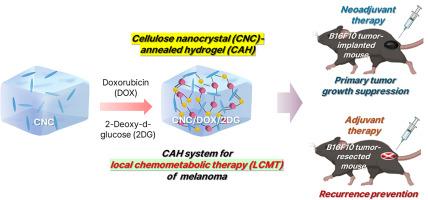Cellulose nanocrystal-annealed hydrogel system for local chemo-metabolic therapy of melanoma
IF 10.5
1区 医学
Q1 CHEMISTRY, MULTIDISCIPLINARY
引用次数: 0
Abstract
A cellulose nanocrystal (CNC)-annealed hydrogel (CAH) structure, including doxorubicin (DOX) and 2-deoxy-d-glucose (2DG), was developed for local chemo-metabolic therapy (LCMT) of melanoma. DOX has been used as a chemotherapeutic agent because of its intercalation into DNA and generation of free radicals. 2DG has been used as a glycolytic inhibitor in multiple metabolic therapies in combination with DOX. Covalent and non-covalent (i.e., ionic and hydrogen bonding) binding approaches between CNC and drug cargo (i.e., DOX and 2DG) were used to tune the rheological properties of the CAH structure to achieve sustained drug release. Reduction of reduced nicotinamide adenine dinucleotide phosphate, adenosine triphosphate, and mitochondrial membrane potential, and elevation of cellular reactive oxygen species and cleaved caspases 3 and 7 were observed following treatment with CNC/DOX/2DG in B16F10 cells. Glutathione depletion, enhanced lipid peroxidation, and decreased lactate levels were observed in the CNC/DOX/2DG group. After intratumoral injection of the CNC/DOX/2DG hydrogel into B16F10 tumor-bearing mice, stronger tumor growth suppression and anti-recurrence capabilities were observed. These findings imply that the viscoelastically modulated CAH system can be a strong candidate for LCMT of melanoma.

用于黑色素瘤局部化疗-代谢治疗的纤维素纳米晶体-退火水凝胶系统。
一种纤维素纳米晶(CNC)-退火水凝胶(CAH)结构,包括多柔比星(DOX)和2-脱氧葡萄糖(2DG),被开发用于黑色素瘤的局部化疗-代谢疗法(LCMT)。DOX 可插入 DNA 并产生自由基,因此一直被用作化疗药物。在多种代谢疗法中,2DG 作为糖酵解抑制剂与 DOX 结合使用。CNC 与药物货物(即 DOX 和 2DG)之间的共价和非共价(即离子和氢键)结合方法被用来调整 CAH 结构的流变特性,以实现药物的持续释放。在 B16F10 细胞中使用 CNC/DOX/2DG 处理后,观察到还原型烟酰胺腺嘌呤二核苷酸磷酸酯、三磷酸腺苷和线粒体膜电位降低,细胞活性氧、裂解的 Caspases 3 和 7 升高。CNC/DOX/2DG 组观察到谷胱甘肽耗竭、脂质过氧化反应增强和乳酸水平下降。在 B16F10 肿瘤小鼠体内注射 CNC/DOX/2DG 水凝胶后,可观察到更强的抑制肿瘤生长和抗复发能力。这些研究结果表明,粘弹性调控 CAH 水凝胶系统是黑色素瘤 LCMT 的理想候选材料。
本文章由计算机程序翻译,如有差异,请以英文原文为准。
求助全文
约1分钟内获得全文
求助全文
来源期刊

Journal of Controlled Release
医学-化学综合
CiteScore
18.50
自引率
5.60%
发文量
700
审稿时长
39 days
期刊介绍:
The Journal of Controlled Release (JCR) proudly serves as the Official Journal of the Controlled Release Society and the Japan Society of Drug Delivery System.
Dedicated to the broad field of delivery science and technology, JCR publishes high-quality research articles covering drug delivery systems and all facets of formulations. This includes the physicochemical and biological properties of drugs, design and characterization of dosage forms, release mechanisms, in vivo testing, and formulation research and development across pharmaceutical, diagnostic, agricultural, environmental, cosmetic, and food industries.
Priority is given to manuscripts that contribute to the fundamental understanding of principles or demonstrate the advantages of novel technologies in terms of safety and efficacy over current clinical standards. JCR strives to be a leading platform for advancements in delivery science and technology.
 求助内容:
求助内容: 应助结果提醒方式:
应助结果提醒方式:


